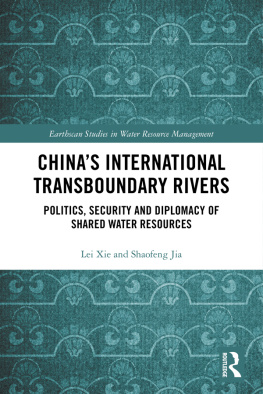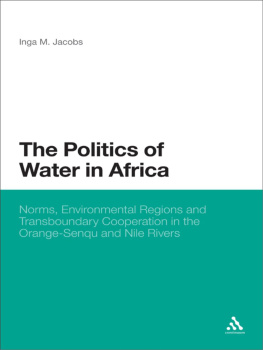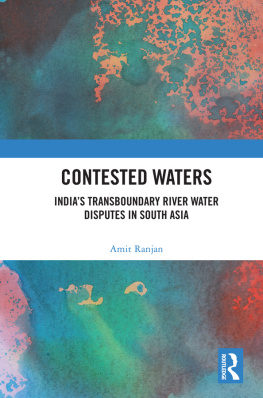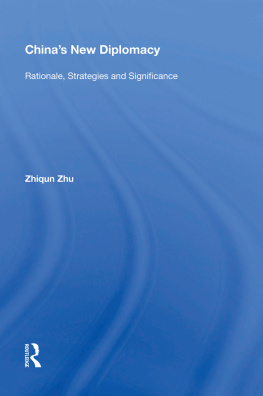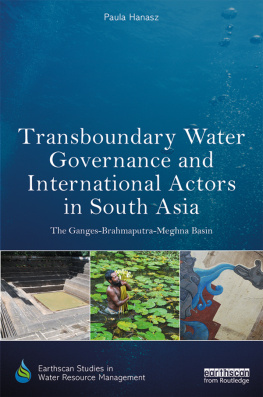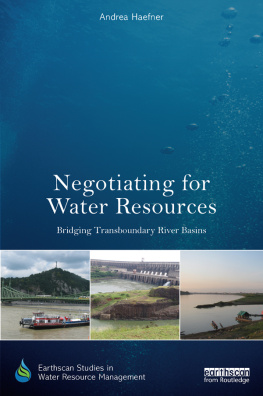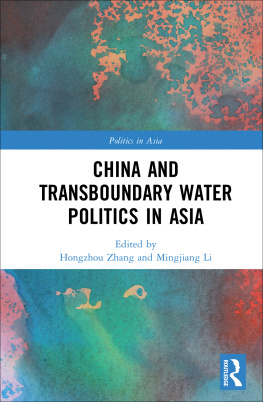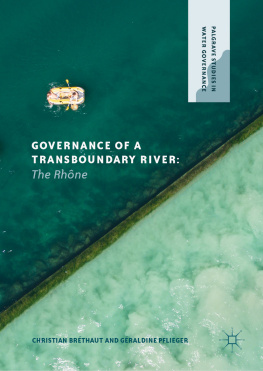Chinas International Transboundary Rivers
China has 40 major transboundary watercourses with neighbouring countries, and has frequently been accused of harming its downstream neighbours through its domestic water management policies, such as the construction of dams for hydropower. This book provides an understanding of water security in Asia by investigating how shared water resources affect Chinas relationships with neighbouring countries in South-East, South, Central and North-East Asia.
Since China is an upstream state on most of its shared transboundary rivers, the countrys international water policy is at the core of Asias water security. These water disputes have had strong implications for Chinas interstate relations, and also influenced its international water policy alongside domestic concerns over water resource management.
This book investigates Chinas policy responses to domestic water crises and examines Chinas international water policy as well as its strategy in dealing with international cooperation. The authors describe the key elements of water diplomacy in Asia which demonstrate varying degrees of effectiveness of environmental agreements. It shows how China has established various institutional arrangements with neighbouring countries, primarily in the form of bilateral agreements over hydrological data exchange. Detailed case studies are included of the Mekong, Brahmaputra, Ili and Amur rivers.
Lei Xie is a Visiting Research Scholar, Institute of Geographic Sciences and Natural Resources Research, Chinese Academy of Sciences, Beijing, China. She receievd her PhD from Wageningen University, the Netherlands, after gaining her BA from School of Government, Peking University, China and MPhil from the Chinese University of Hong Kong.
Shaofeng Jia is Professor and Chair of the Department of Water Resources Research, Institute of Geographic Sciences and Natural Resources Research, Chinese Academy of Sciences, Beijing, China.
Earthscan Studies in Water Resource Management
Community Management of Rural Water Supply
Case Studies of Success from India
Paul Hutchings, Richard Franceys, Stef Smits and Snehalatha Mekala
Drip Irrigation for Agriculture
Untold Stories of Efficiency, Innovation and Development
Edited by Jean-Philippe Venot, Marcel Kuper and Margreet Zwarteveen
Water Policy, Imagination and Innovation
Interdisciplinary Approaches
Edited by Robyn Bartel, Louise Noble, Jacqueline Williams and Stephen Harris
Rivers and Society
Landscapes, Governance and Livelihoods
Edited by Malcolm Cooper, Abhik Chakraborty and Shamik Chakraborty
Transboundary Water Governance and International Actors in South Asia
The GangesBrahmaputraMeghna Basin
Paula Hanasz
The Grand Ethiopian Renaissance Dam and the Nile Basin
Implications for Transboundary Water Cooperation
Edited by Zeray Yihdego, Alistair Rieu-Clarke and Ana Cascao
Freshwater Ecosystems in Protected Areas
Conservation and Management
Edited by Max C. Finlayson, Jamie Pittock and Angela Arthington
Participation for Effective Environmental Governance
Evidence from European Water Framework Directive Implementation
Edited by Elisa Kochskmper, Edward Challies, Nicolas W. Jager and Jens Newig
Chinas International Transboundary Rivers
Politics, Security and Diplomacy of Shared Water Resources
Lei Xie and Shaofeng Jia
For more information and to view forthcoming titles in this series, please visit the Routledge website: www.routledge.com/books/series/ECWRM/
First published 2018
by Routledge
2 Park Square, Milton Park, Abingdon, Oxon OX14 4RN
and by Routledge
711 Third Avenue, New York, NY 10017
Routledge is an imprint of the Taylor & Francis Group, an informa business
2018 Lei Xie and Shaofeng Jia
The right of Lei Xie and Shaofeng Jia to be identified as authors of this work has been asserted by them in accordance with sections 77 and 78 of the Copyright, Designs and Patents Act 1988.
All rights reserved. No part of this book may be reprinted or reproduced or utilized in any form or by any electronic, mechanical, or other means, now known or hereafter invented, including photocopying and recording, or in any information storage or retrieval system, without permission in writing from the publishers.
Trademark notice: Product or corporate names may be trademarks or registered trademarks, and are used only for identification and explanation without intent to infringe.
British Library Cataloguing in Publication Data
A catalogue record for this book is available from the British Library
Library of Congress Cataloging in Publication Data
Names: Xie, Lei, author. | Jia, Shaofeng, 1964 author.
Title: Chinas international transboundary rivers : politics, security and diplomacy of shared water resources / Lei Xie and Jai Shaofeng. Description: Abingdon, Oxon ; New York, NY : Routledge, 2018. | Series: Earthscan studies in water resource management | Includes bibliographical references and index.
Identifiers: LCCN 2017030170| ISBN 9781138689060 (hardback) | ISBN 9781315537900 (ebook)
Subjects: LCSH: Water useGovernment policyChina. | Water-supply Co-managementChina. | Water-supplyChinaInternational cooperation. | Water resources developmentPolitical aspectsChina. | Water rightsChina. | Water securityChina. | ChinaForeign relationsAsia.
Classification: LCC HD1698.C5 X526 2018 | DDC 333.91/620951dc23
LC record available at https://lccn.loc.gov/2017030170
ISBN: 978-1-138-68906-0 (hbk)
ISBN: 978-1-315-53790-0 (ebk)
Typeset in Goudy
by Wearset Ltd, Boldon, Tyne and Wear
To Lili
Preface
Water is a powerful element on the planet. It nourishes all life and shapes civilizations. Water features prominently in Chinese culture. Laozi, an ancient philosopher states in the Book of Tao and Theh, The top virtue is like water, benefiting all, contending with none, and is content with what all others disdain. Therefore it is close to the Word.
China is one of the most water-rich countries in the world and benefits from 4,000 years experience in the governance of water, with constant evolution in its approaches and philosophy. For a long time, management and control were a strong focus of Chinas approach to the use of water. This is also referred to as Shuili, which means drawing the benefits from water resources as well as avoiding the difficulties that water disasters could bring. Today, natural scientists and engineers play a significant role in water governance. Emphasis is placed on technical issues in water resource management and in the sharing of water resources across borders. However, as the contribution of social scientists remains doubted to this day, the central government has not yet established effective multilevel water governance that incorporates various actors.
This book is a cross-disciplinary study that has adopted subjects of politics, water resource management, international relations and area studies of China and Asia. By doing so, it aims to broaden our understanding of the effectiveness of collaborative mechanisms that are reached among riparian countries; it also provides insights on Asias regional security, which is potentially threatened by ongoing water disputes between China and neighbouring states.


